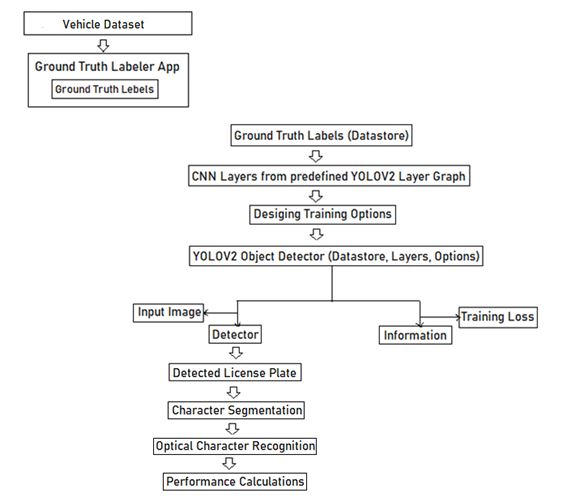Automatic Vehicle License Plate Recognition Using Optimal K-Means with Convolutional Neural Network for Intelligent Transportation Systems
Objective
This project presents an effective deep learning-based VLPR model using optimal K-means clustering-based segmentation and convolutional neural network (CNN) based recognition, called OKM-CNN model for recognition of number plate.
Abstract
In this work, detection of vehicle license plates and recognition of characters are performed using YOLO network. Due to recent developments of highways and the increased utilization of vehicles, significant interest has been paid on the latest, effective, and precise intelligent transportation system (ITS).
The process of identifying particular objects in an image plays a crucial part in the fields of computer vision or digital image processing. Vehicle license plate recognition (VLPR) process is difficult because of variations in viewpoint, shape, color, multiple formats and non-uniform illumination conditions while acquiring images.
This paper presents an effective deep learning based VLPR model using YOLO (You Only Live Once) for the detection process of license plate and OCR (Optical Character Recognition) for the process of character recognition in the license plate. For the enhancement of license plates, some Image Processing Techniques are utilized.
Keywords: Intelligent Transportation System (ITS), Vehicle License Plate Recognition (VLPR), YOLO (You Only Look Once), OCR (Optical Character Recognition), Image Processing Techniques.
NOTE: Without the concern of our team, please don't submit to the college. This Abstract varies based on student requirements.
Block Diagram

Specifications
Software & Hardware Requirements:
Software: Matlab 2018a or above
Hardware:
Operating Systems:
- Windows 10
- Windows 7 Service Pack 1
- Windows Server 2019
- Windows Server 2016
Processors:
Minimum: Any Intel or AMD x86-64 processor
Recommended: Any Intel or AMD x86-64 processor with four logical cores and AVX2 instruction set support
Disk:
Minimum: 2.9 GB of HDD space for MATLAB only, 5-8 GB for a typical installation
Recommended: An SSD is recommended A full installation of all MathWorks products may take up to 29 GB of disk space
RAM:
Minimum: 4 GB
Recommended: 8 GB
Learning Outcomes
- Introduction to Matlab
- What is EISPACK & LINPACK
- How to start with MATLAB
- About Matlab language
- Matlab coding skills
- About tools & libraries
- Application Program Interface in Matlab
- About Matlab desktop
- How to use Matlab editor to create M-Files
- Features of Matlab
- Basics on Matlab
- What is an Image/pixel?
- About image formats
- Introduction to Image Processing
- How digital image is formed
- Importing the image via image acquisition tools
- Analyzing and manipulation of image.
- Phases of image processing:
- Acquisition
- Image enhancement
- Image restoration
- Color image processing
- Image compression
- Morphological processing
- Segmentation etc.,
- About Artificial Intelligence (AI)
- About Machine Learning
- About Deep Learning
- About layers in AI (input, hidden and output layers)
- Building AI (ANN/CNN) architecture using Matlab
- We will be able to know what’s the term “Training” means in Artificial Intelligence
- About requirements that can influence the AI training process:
- Data
- Training data
- Validation data
- Testing data
- Hardware requirements to train network
- How to detect and recognize the object using AI
- How to extend our work to another real time applications
- Project development Skills:
- Problem analyzing skills
- Problem-solving skills
- Creativity and imaginary skills
- Programming skills
- Deployment
- Testing skills
- Debugging skills
- Project presentation skills
- Thesis writing skills


 Paper Publishing
Paper Publishing
